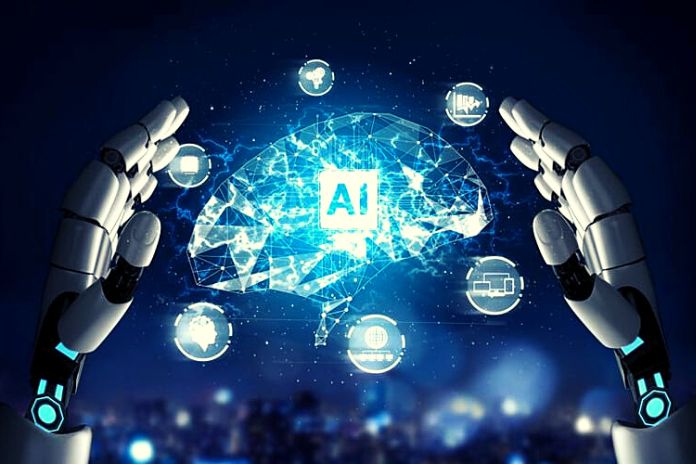Artificial Intelligence (AI) is no longer an alien technology and has become part of the routine of people and companies worldwide.
Who doesn’t remember the countless movies with almost human-looking robots from a few years ago? But, far from this cinematographic image, intelligent machines are already a reality and are revolutionizing the interaction of human beings with technological devices.
Artificial Intelligence works based on combining digital data, high information processing power, and intelligent algorithms. For this, it has robust systems and hardware with advanced technology.
The operation of AI can also involve Machine Learning (ML), which is the ability to learn autonomously. In this case, machines learn by identifying patterns and processing data.
Its evolution is Deep Learning, which uses complex neural networks to interpret significant volumes of information. Finally, Natural Language Processing (NLP) completes the operating system.
Application Of Artificial Intelligence In Companies
Many companies are already using Artificial Intelligence to perform repetitive tasks or even more complex activities. See some application examples:
Chatbots
Chatbots automate service on digital channels. The system is preconfigured to understand keyword questions and send automatic responses to the customer. If necessary, the service can be redirected to a human attendant. This shortens the wait for service, reduces costs, and improves the consumer’s experience with the brand.
Robotization
Factories and other companies are taking advantage of Industry 4.0 innovations and already have autonomous robots on production lines. With robotization, it is possible to have more regularity in the quality standard, avoid failures and speed up manufacturing. The robot learns the job and then reproduces it independently.
Virtual Assistant
Virtual assistants are also in the crosshairs of companies. Systems like Siri and Alexa make everyday life easier, performing various tasks with voice commands. For example, it is possible to schedule video conferences, send emails or even make regular announcements without typing anything.
Management Applications
Artificial Intelligence still guarantees essential support to management by improving customer relationship systems, business management, and more. These software types can measure employee and overall business performance, benchmark, and help with data-driven decision-making.
Security Mechanisms
Intelligent systems are improving the security mechanisms that protect consumer data. This agenda becomes very relevant with the high volume of information on digital channels – from name to financial data. In addition, technology can identify attack patterns and develop new protection mechanisms, continually improving the security strategy.
Predictions
Intelligent systems are improving the security mechanisms that protect consumer data. This agenda becomes very relevant with the high volume of information on digital channels – from name to financial data. In addition, technology can identify attack patterns and develop new protection mechanisms, continually improving the security strategy.
Teaching
Teaching has benefited from intelligent innovations. For example, autonomous systems can act as a “teacher” for teams, offering personalized information for each query type. The idea is to make processes more agile and dynamic, avoiding failures resulting from the lack of simple data.
Process Automation
Several business processes can be automated to optimize operational efficiency. For example, repetitive tasks, sharing information across industries, and even recruiting new employees can all benefit from Artificial Intelligence.
Benefits
Implementing an Artificial Intelligence system can bring many benefits to the business:
- Cost reduction: processes become more agile with intelligent use of available resources.
- Process optimization: activities are now performed based on data, eliminating unnecessary steps that do not add value to the final product.
- Business development: the company knows its weaknesses and opportunities, ensuring accelerated growth.
- Personalized experience: finally, it is possible to offer a customized experience to the customer and adapt the systems to the demands of the business.
Artificial Intelligence In Your Business Sectors
Intelligent systems can be applied in different sectors of the company, including:
Financial
In Financial Management, Artificial Intelligence helps to identify failures, automate the payment of bills and improve financial planning.
In addition, it is possible to follow the sector’s accounting standards more straightforwardly and access all the necessary documentation on the same platform.
HR
Intelligent automation systems for HR Management can contribute to several tasks:
- Selection of employees through the standardization of information;
- Onboarding of new employees, ensuring that all entry steps are completed – the same goes for offboarding;
- Employee information management, as well as benefits;
- Automatic entry, exit, and lunchtime registration.
Marketing
The Marketing Management sector benefits from consumer behavioral analysis and market forecasts.
In addition, thanks to the Customer Relationship Management system, it is possible to create personalized marketing actions and improve the customer’s experience with the company.
Operations
Operational routines are more straightforward and more dynamic with Industry 4.0 innovations. As a result, it is possible to improve machine maintenance, streamline production and even simulate the development of products with more safety and lower cost.
How To Apply?
Those interested in Artificial Intelligence’s benefits and want to develop an infrastructure based on technology may encounter some initial challenges. To help you, we separate three essential tips:
Identify The Objectives
List the expected goals with the use of AI. Evaluate all processes that can be improved and the strategic benefits for the business. Thus, it is easier to define the areas prioritizing adhering to the technology.
Understand And Prepare The Necessary Infrastructure
It is necessary to understand the current infrastructure, what adaptations are required and how much it will cost. Employees also need the training to handle the new tools.
Process Mapping
Finally, map all the company’s processes to identify which ones will be optimized with Artificial Intelligence.

